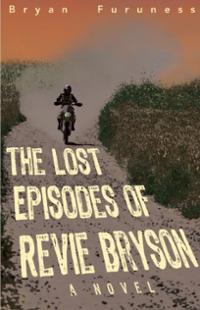 Back in 2008, the super-smart literary magazine Hobart came out with a themed issue on games—games of all sorts: card games, kids’ playground games, Dungeons and Dragons, Jenga, computer games, you name it. I bought two copies and sent one to my son Nathaniel, then in his last year of college. He was a serious video gamer, and I thought he’d like the issue enough that we could talk about it. Soon after receiving his copy, Nathaniel called and surprised me by saying that his favorite piece in the issue was a story called “Ballgrabber,” by Bryan Furuness, which had nothing to do with computer games. I immediately read it and agreed with my son—this story was ace-on. I asked Aaron Burch, the editor of Hobart, if he could give me the author’s email, and when he graciously did I wrote and asked Bryan if he would send a story to Ninth Letter for consideration. He did—“Man of Steel,” which also featured the sometimes anarchic and strangely touching imagination of an adolescent boy named Revie. All the fiction editors immediately loved this story, and we accepted it pronto.
Back in 2008, the super-smart literary magazine Hobart came out with a themed issue on games—games of all sorts: card games, kids’ playground games, Dungeons and Dragons, Jenga, computer games, you name it. I bought two copies and sent one to my son Nathaniel, then in his last year of college. He was a serious video gamer, and I thought he’d like the issue enough that we could talk about it. Soon after receiving his copy, Nathaniel called and surprised me by saying that his favorite piece in the issue was a story called “Ballgrabber,” by Bryan Furuness, which had nothing to do with computer games. I immediately read it and agreed with my son—this story was ace-on. I asked Aaron Burch, the editor of Hobart, if he could give me the author’s email, and when he graciously did I wrote and asked Bryan if he would send a story to Ninth Letter for consideration. He did—“Man of Steel,” which also featured the sometimes anarchic and strangely touching imagination of an adolescent boy named Revie. All the fiction editors immediately loved this story, and we accepted it pronto.
As the years passed I wondered if those Revie tales were being worked into a longer fiction, and in 2012 was delighted to hear that Bryan Furuness was publishing his first novel, The Lost Episodes of Revie Bryson, with Black Lawrence Press. It’s a novel that fulfills all the promise of those early stories, combining humor and wisdom with the unfolding of a deeply satisfying narrative structure. Revie Bryson, on the cusp of turning twelve, is in tow with his mother’s wild (to put it mildly) religious imagination, a secret partnership in the absence of his father’s over-extended work schedule at the Golf Dome. Before long, Mom has left the family, leaving a hole that Revie fills with an unpredictable series of adventures.
Beside his novel, Bryan Furuness has published his stories in Ninth Letter, Sycamore Review, Hobart and elsewhere, including New Stories from the Midwest and Best American Nonrequired Reading. He teaches at Butler University, where he runs the small press, Pressgang.
Interview:
Philip Graham: Before your novel, The Lost Episodes of Revie Bryson, came out, I had read two stories featuring Revie, “Ballgrabber” and “Man of Steel,” and I was surprised that some version of them as chapters weren’t included in your book. Are these further “lost episodes” that might be collected in another novel or collection? Are you thinking of turning Revie into a continuing fictional project, much the way Eric Craft has done with his series of novels featuring his character/alter ego Peter Leroy?
Bryan Furuness: You’ve got a good memory. And you’re right: there were several Revie stories that didn’t make the final cut. At the beginning of the process—when I wrote “Ballgrabber” and “Man of Steel”—the project was a story cycle. When I burned it all down and started over as a novel, fixing Revie’s age at twelve when he gets the Christ complex, some of the early material no longer fit (and believe me, I tried to make it fit).
I don’t really have any idea what to do with the lost episodes of The Lost Episodes. Your idea about a continuing project is intriguing. One of the lost episodes features Revie as a grown-up with a family of his own, and he’s never told them about the weirdness of his twelfth year…yeah, I might revisit Revie in the future.
I’m intrigued that you tried to make those early stories fit into a new conception of the material. I think a lot of novelists lose sleep over the unequal distribution of round and square pegs. Could you elaborate a little on how you worked through that?
I wrote story after story about this kid whose mother had left him, and then I wrote some earlier stories with the mom in them, but there was a big gap between those two epochs. Debra Spark, one of my advisors in the Warren Wilson Program for Writers, put her finger right on the gap when she asked me, “How could this mother leave her child?”
I couldn’t really answer the question (“Um, she just did it?”), which told me I didn’t really know that character. And in a book that is driven by Revie’s desire to figure out his mother, how she could be one person and then another, that was a real problem. I couldn’t band-aid the problem; I had to start over, figure her out from the first lines. That’s when I lost “Ballgrabber” and “Man of Steel” and a bunch of other stories.
Earlier I said I burned down the story cycle, but really it was more of a dismantling. Sure, I lost those stories, but I was able to salvage some parts and pieces (Not as many pieces as I thought I’d be able to salvage when I tore it all down, though).
There’s a wonderful line in the novel when Revie’s Mom is preparing to leave the family, which she thinks is for everyone’s good. Revie’s tries various desperate negotiations to convince his mother out of her decision, all unsuccessful, and he finally observes “At last I saw the limits to a child’s power: you got just enough to screw things up, but not enough to fix anything.” I love this sentence—its truth is both humorous and deadly serious, and these limits also pretty much fuel the drama of the rest of the novel.
You’re right that Revie screws things up, but he’s not alone. His mother and father are running alongside him on the road to hell, screwing everything up despite/because of their best intentions. Maybe it’s because they’re all kid-like. Could we call it a coming-of-age novel for everyone in that family? They’ve all got to let go of some kid-ness and grow up. In the end, their attempt at a fix might seem a little weird or misguided, but it works because they’re all doing the same weird thing together. Every family has its own language, its own internal logic that’s going to look crazy to an outsider.
 “A coming-of-age novel for everyone in that family”—wonderful!
“A coming-of-age novel for everyone in that family”—wonderful!
Revie’s parents married while quite young, especially his mother—she was sixteen, right? A lot of families are like this, I think, parents and children alike slouching toward some form of possible maturity. But most coming-of-age novels ignore this and concentrate mainly on the child’s experiences, and bestow less empathy on the adults. This is one of the reasons why your novel feels so original. Was this your original plan, or did it develop over the course of the writing?
It took me about a decade to write this book, which means I started drafting it before I had children. When I finished one of the early drafts, one of my readers said that she felt like she knew Revie and his mother, but she didn’t really know much about the father’s character. I wanted to believe that the father was just quiet, but in truth he was a blank.
When my reader made that comment, my boys were little, and I was figuring out who I was as a father. I think I had to figure out my role a little bit before I could imagine the father in this book.
It probably sounds like I’m confessing to a total lack of imagination, but I don’t think that’s it, exactly. Like an oyster needs a grain of sand as a starting point for a pearl, my imagination needs a point of reference. A toehold. The tiniest cornerstone. Writing Revie was relatively easy because I knew what it was like to be a kid, and I knew what it was like to look back on boyhood. I had a constellation of references. When I started writing the father, though, I didn’t know what it felt like to have someone really depend on you; I didn’t know what it was like to have such a small margin for screwing up, to want so desperately to not screw up, and still, despite all that, to screw up.
But I learned. I came of age as a father. And it helped me figure out the father in the book, and his own coming-of-age.
The point of view of the novel is of course the older Revie, who is now wiser than his younger self but also his younger parents. Still, the younger Revie is pretty precocious, observing, for instance, that, “questions are crowbars.” Yet he also possesses an adolescent’s exasperating mix of charm, self-involvement, and delusion, and a touch of cruelty. In other words, he’s an utterly alive character.
This week I’m teaching at the creative writing camp at Butler, where kids from elementary school through high school get together to geek out about words and stories. Talking to these kids, I’m reminded again and again about how growing up is an uneven, ungainly process. In one breath a kid might tell me something really insightful about the myth of Sisyphus, and do it in a way that is gentle and respectful and helps me learn without making me feeling stupid. Then in the next breath that kid might mention that all his teachers are out to get him because they’re jealous of his brain. Oh, kid, I think. There’s just no way you’ve got that right…
But I was the same way. As a boy, I was infected with mild strains of paranoia and solipsism, and I was far from the only one. Here’s a theory: to be a kid with a live mind is to be deluded and self-involved, but also curious and evolving at hyperspeed; to be insightful in surprising ways, totally off base in other ways, but never afraid to make sweeping pronouncements, like a little de Tocqueville in the Land of Adults.
Revie is also a bit of a philosopher, perhaps inspired by his very problematic substitute teacher, Miss Dupay. I love his description of her early on: “With a cigarette in one hand and a steaming coffee cup in the other, she looked vaguely volcanic.” She also is prone to large pronouncement, such as “The universe is buckshot with vacuums, and so are we.” She meets her match in Revie, though, who harbors his own metaphor: “The universe was shaped like a racetrack. Truth was an awful boomerang. I knew this, and I was twelve years old.”
 You’ve uncovered my obsessions! I’m a sucker for pronouncements and metaphors and theories that take a big swing. The bigger the claim, the better. If you start a sentence with “The universe—” you’ve got me on the hook.
You’ve uncovered my obsessions! I’m a sucker for pronouncements and metaphors and theories that take a big swing. The bigger the claim, the better. If you start a sentence with “The universe—” you’ve got me on the hook.
This probably reveals some giant flaw in my character, doesn’t it? These sound like the ideal traits for a cult member. God, I hope I’m not on TV someday saying, “Sure, he firebombed the whole campground, but you should have heard him talk. He was really interesting, you know?”
Well, maybe you’re being too hard on yourself. What I liked about these pronouncements was that they were competing ways of describing the world, the role of stories, and the speakers themselves. Poor Miss Dupay is confessing more than Revie is willing to hear when she speaks of those internal vacuums. And Revie at that point had ducked more than one family boomerang speeding toward him, and there would be more to come.
And don’t forget the one Revie offers up right before the weird dinner party with Miss Dupay: “The universe works like a toilet…Things start off far apart, but everything swirls together faster and faster in the end.”
I like how you’re reading those lines on different levels. Seen in that light, this pronouncement might offer up something about Revie, something about the way he sees the world at that moment, and a little something about the way the story is headed.
To get back to that boomerang metaphor of Revie’s, it seems to describe the structure of the novel. Without giving too much away, I really admire how the meaning of the “lost episodes” of the book’s title reveals itself near the end as a form of reclamation, a triumph over silence.
Early in this project, I wrestled with questions about point of view: first-person felt right from the beginning, but why? What’s Revie’s agenda? Why is he telling this story?
When I figured out that he’d never told it before, that he’d buried it for years, that it had become his own lost episode, the tiny planets of the novel aligned. There was an echo across generations, and a kind of symmetry between the beginning of the book and the end.
I like thinking about the design of a story, the architecture of a book. What echoes? What shape does it make? How do you find balance? I’m working on a book now that has a narrator dictating his account to an administrative assistant. A seminary dropout, he keeps making references to Paul the Apostle, and when I recently learned that most scholars believe that Paul dictated his letters to an amanuensis(!), I felt like I had discovered Atlantis.
Now, who knows if any of that will survive in the final version of the book, or if the book itself will make it to publication, but the thrill I felt in that moment is the thing that pulls me back to the desk every day.
The symmetry and alignment you mention for The Lost Episodes goes even deeper than architecture, I think. Revie is on a truth-telling quest, and his recovery of family events is also self-recovery—it extends to his own self-portrait, warts and all. That’s why the reader can admire him on one page, and be exasperated or appalled by him on another. The older Revie needs to reveal every aspect of his younger self—in tearing off the family’s mask, he’s tearing off his own.
Revie’s like me, in that we both figure things out by telling stories. Revealing himself might be the first and most necessary step for his truth-telling quest (I like that phrase; consider it stolen), but he goes beyond that step to question and probe and realize things about himself and his family that he didn’t know at the beginning of this quest. As much as anything, it’s the act of storytelling that redeems him.
Ah, but redemption is an ongoing process, isn’t it? I don’t get the sense that Revie has solved himself by the end of the book—instead, he’s learned how to try. As a reader, I wish him well.
Everything’s ongoing, everything’s cyclical. If characters (and real people) can have more than one coming-of-age, then we can all certainly have phases of redemption. Followed, of course, by more failure. Which is really the seed for another story. Total redemption is the only way to really kill a character.
One aspect of your novel I’ve been meaning to touch on is that it’s often hilarious. Wanting his parents to get back together again, Revie undermines his long-suffering father’s project to slim down and begin dating by surreptitiously bulking up the daily low-fat cabbage soup with butter and vegetable oil. “Cabbotage,” he calls it. And then there are his mother’s absurdist bible stories (“Jesus was a good kid, but he could drive his mother crazy”), a Tarot card reading grandmother, and the motley crew at the local bar, the Tap. You do something I really admire, which is to disguise what’s dead serious, even heartbreaking, with humor, and conversely to thread your wit with a sharp needle.
Bless your giant heart. You may not know it, but you could not have given me a higher compliment. As a reader, there’s nothing I love more than writing that nails the intersection of comedy and gravity. Writers like Vonnegut or George Saunders or Lorrie Moore don’t move from the ridiculous to the sublime; in their hands, the ridiculous becomes the sublime. I’m always aiming for that zone, and it gladdens my heart to hear that, at least a few times, I stuck the landing.
Links & Resources
- For news and events, visit Bryan Furuness at his website.
- Check out reviews of The Lost Episodes of Revie Bryson at the Rumpus and HTMLGIANT.
- Read his very short story “Portrait of Lucifer as a Young Man” at Freight Stories.
- And get your Bryan Furuness pep-talk here: “Ecclesiastes for Writers: A Furunessay in Six Answers.”
Contributor
 Philip Graham is the author of seven books of fiction and nonfiction, including the novel How to Read an Unwritten Language, and the travel essays The Moon, Come to Earth. His work has appeared in The New Yorker, Washington Post Magazine, McSweeney’s, and elsewhere, and his most recent book is Braided Worlds, a memoir of Africa. He teaches at the University of Illinois, Urbana-Champaign, and the Vermont College of Fine Arts. A Co-founder of Ninth Letter, Graham has served as both the fiction and nonfiction editor. Visit his author Website: philipgraham.net
Philip Graham is the author of seven books of fiction and nonfiction, including the novel How to Read an Unwritten Language, and the travel essays The Moon, Come to Earth. His work has appeared in The New Yorker, Washington Post Magazine, McSweeney’s, and elsewhere, and his most recent book is Braided Worlds, a memoir of Africa. He teaches at the University of Illinois, Urbana-Champaign, and the Vermont College of Fine Arts. A Co-founder of Ninth Letter, Graham has served as both the fiction and nonfiction editor. Visit his author Website: philipgraham.net





